Tammy
Wynette

-
Inducted1998
-
Born
May 5, 1942
-
Died
April 6, 1998
-
Birthplace
Itawamba County, Mississippi
In the late 1960s and early 1970s, Tammy Wynette was one of the creative, unique, and defining stylists and songwriters articulating women’s perspectives with an autobiographical slant that made her life as much an object of audience interest as her music.
A Hardscrabble Childhood
Like her country sisters Loretta Lynn and Dolly Parton, Tammy Wynette grew up in a hardscrabble, rural household in the South, but she had big-city dreams. Born Virginia Wynette Pugh, in Itawamba County, Mississippi, Wynette’s cotton-farming grandparents raised her. Her father, William Hollice Pugh, died of a brain tumor when she was less than a year old; he left her a recording of himself and a musical legacy, as he had attempted to be a professional singer rather than a sharecropper. Her mother, Mildred, left for Memphis to work in a defense plant during World War II.
Wynette worked in the cotton fields, played her father’s inherited instruments, took music lessons, and followed the careers of many gospel quartets who traveled through Mississippi and Alabama during the southern gospel explosion of the late 1940s and early 1950s. She was one of a trio of friends—“Wynette, Linda, and Imogene”—who performed on a local gospel radio show.
Wynette married Euple Byrd a month before she graduated from high school in 1959. They had two children, and with no steady employment, Byrd moved the family from place to place. Wynette went to beautician’s school and even did a stint as a barmaid and singer in Memphis. Divorced in 1965, at the age of twenty-three, she was by then the mother of three, working at a Birmingham beauty salon, singing on a local TV show, living in government housing, and making $45 a week. But several trips to Nashville and a brief tour with Porter Wagoner fueled her fantasy of a career in music, and she made the move to Nashville in 1966.
Songs
00:00 / 00:00
00:00 / 00:00
00:00 / 00:00
A Fruitful Partnership with Billy Sherrill
After her move, Wynette walked into the office of producer-songwriter Billy Sherrill, of Epic Records, to pitch some songs. Two weeks later her name was changed to Tammy Wynette, and she was recording for Epic, with Sherrill, who would write many of her songs.
Wynette’s first recording, the Johnny Paycheck–Bobby Austin composition “Apartment #9” (1966), earned decent airplay but did not ignite as a hit. But her next release, “Your Good Girl’s Gonna Go Bad” (1967), in which she sang of a woman who was going to join her man in his own philandering game, reached the Top Ten. Wynette’s first #1, a duet with David Houston titled “My Elusive Dreams,” followed later that year, and her first solo #1, “I Don’t Wanna Play House” (also released in 1967) won her a Grammy. Her classic “D-I-V-O-R-C-E” followed in 1968, as Wynette continued to explore the complicated feelings of women and children faced with the breakup of a family, an important theme both personally and musically throughout her career.
Sherrill and Wynette collaborated in writing her signature tune, “Stand by Your Man” (1968), a #1 country smash that also went to #19 on the pop charts. At the height of the women’s liberation movement, as bras were being burned in a trash can at the Miss America pageant in Atlantic City, Wynette’s song recommending forgiveness of wayward men hit the airwaves. A statement of womanly domestic strength, the record nevertheless drew harsh criticism in some quarters, but also led to the first of Wynette’s three consecutive Country Music Association Female Vocalist of the Year awards (1968-1970). “Stand by Your Man” also entered the movies in 1970’s Five Easy Pieces, starring Jack Nicholson.
Assertively working-class and womanly, Tammy Wynette expressed the difficulties facing working women: raising children, holding down a job, and performing domestic roles. Her “steel magnolia” image allowed her to work within a male-dominated environment in which prejudices against women were still strong.
“‘Til I Can Make It on My Own”
The Johnny Cash Show, 1976
“Two Story House” with George Jones
George Jones with a Little Help from His Friends HBO special, 1981
Photos
-
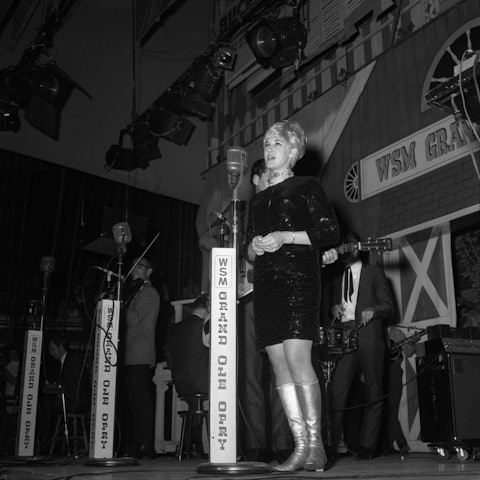
Tammy Wynette performing at the Grand Ole Opry, 1969.
-
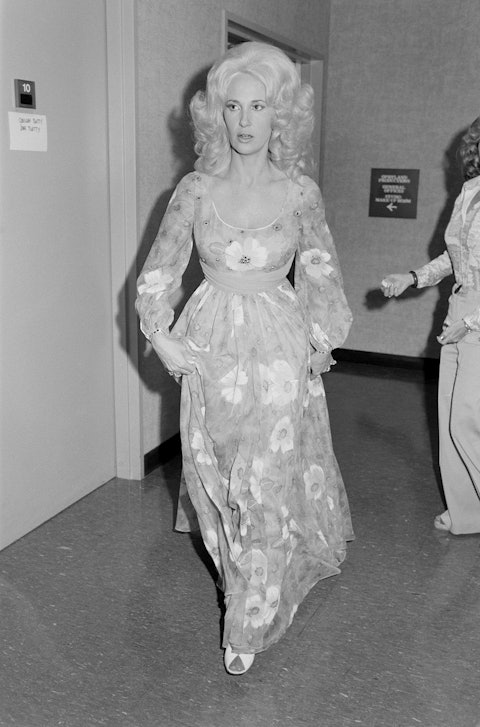
Tammy Wynette backstage at the Country Music Association Awards, 1975. Photo by Raeanne Rubenstein.
-
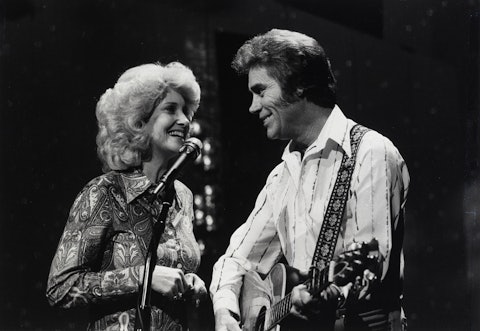
Tammy Wynette and George Jones, 1984. Photo by Walden S. Fabry Studios.
-
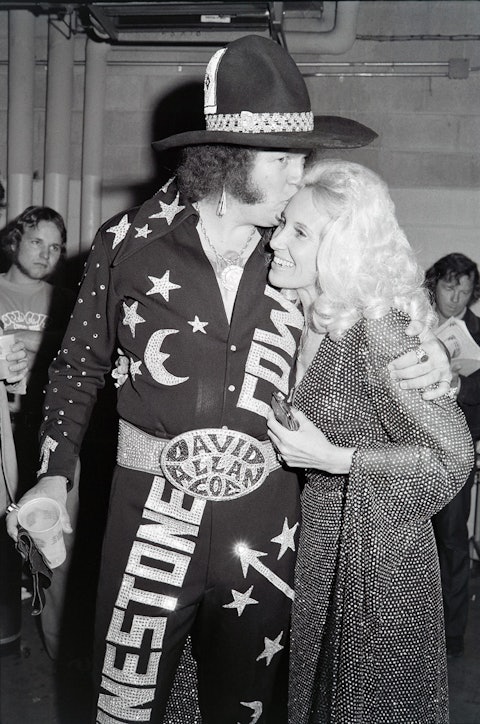
Tammy Wynette backstage at the Country Music Association Awards with David Allan Coe, 1976. Photo by Raeanne Rubenstein.
-
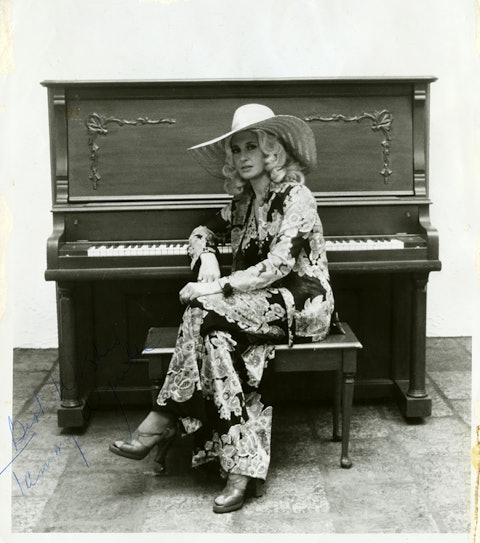
Tammy Wynette, 1976.
-
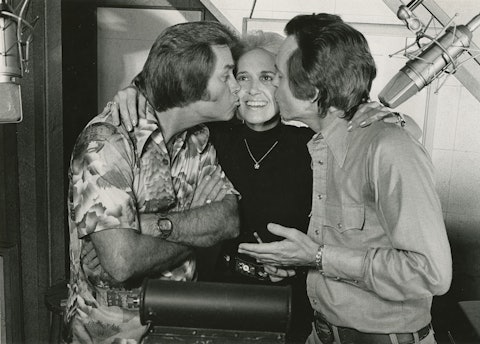
From left: George Jones, Tammy Wynette, and Billy Sherrill, 1973. Photo by Thomas J. Clark.
-
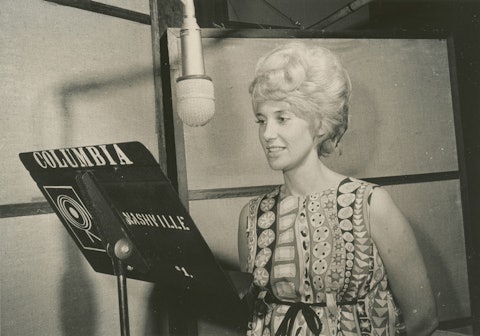
Tammy Wynette, 1970. Photo by Bill Goodman for the Nashville Banner
-
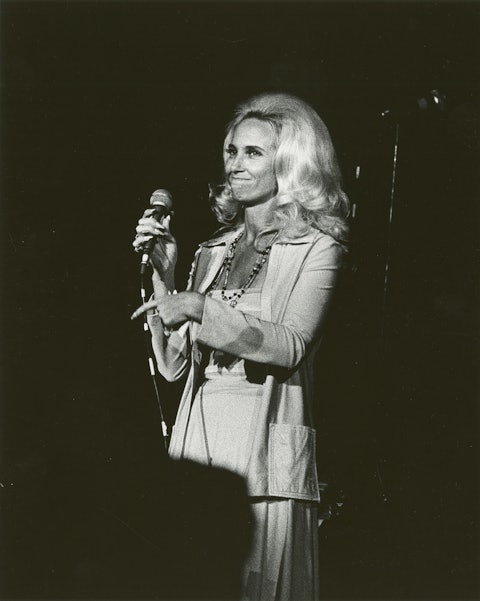
Tammy Wynette performing at the third annual Fan Fair, 1974. Photo by Caleb A. Rawstron.
-
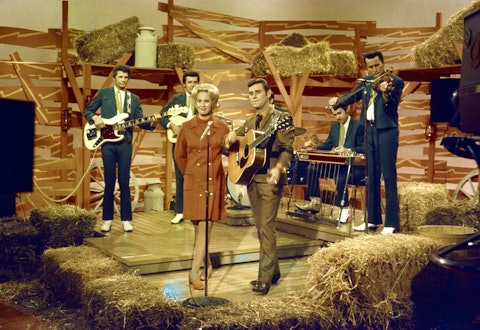
Tammy Wynette and George Jones performing on Hee Haw, 1970.
-

Tammy Wynette and producer Jerry Crutchfield at Stargem Recording Studios, 1980. Photo by Beth Gwinn.
Love and Heartbreak, Musically and Personally
Wynette co-wrote her next two hit singles, “Singing My Song” and “The Ways to Love a Man” (both 1969). But no matter who wrote her songs, her recordings were a seamless presentation befitting the “Heroine of Heartbreak.” Her gripping, teardrop-in-every-note vocal style seemed to weep with emotion, while she elaborated on the theme that suffering ennobles a woman.
Wynette’s marriage to singer-songwriter Don Chapel in 1967 was beset by professional jealousy. In 1968, country superstar George Jones witnessed a fight between the Chapels, and at Jones’s urging, Wynette and her daughters drove away with him. Wynette and Jones married February 16, 1969, and Wynette’s fourth daughter, Georgette, was born in 1970.
Jones and Wynette, nicknamed the “President and First Lady” of country music, recorded a string of hit duets that seemed drawn directly from their volatile relationship, which resulted in divorce in 1975. Their classic recordings included “Two Story House,” “Golden Ring,” and the humorous “(We’re Not) The Jet Set.”
Wynette married Nashville businessman Michael Tomlin within weeks of their meeting, in 1976. The marriage lasted six weeks. In 1978, she married her fifth husband, songwriter-producer George Richey, who had been present in her life for many years, contributing his business acumen and accomplished musicianship. Wynette’s 1979 autobiography and a 1981 TV movie based on her life chronicled her frequent illness, often tumultuous relationships, and other hardships—such as being abducted and beaten, having a death threat placed on her life, and being involved in a public bankruptcy case.
Even More Collaborations
By the end of the 1980s, Wynette had scored twenty #1 singles and sold more than thirty million records. Her surprising 1991 collaboration with British duo the KLF—which resulted in an international hit with their dance-pop number “Justified and Ancient”—capped a decade of collaboration projects that extended beyond the country field. In 1995, she joined Jones again to make the duet album One (MCA), produced by Tony Brown and Norro Wilson.
Wynette died of a blood clot at age fifty-five and was mourned by the industry and her fans during a nationally televised service, broadcast from the Ryman Auditorium on April 9, 1998. Appearing at the memorial were, among others, Randy Travis, the Oak Ridge Boys, Dolly Parton, Merle Haggard, Wynonna, and Lorrie Morgan.
Throughout her career, Wynette cultivated a professional, dignified, and ladylike, yet tough, personality and a cosmopolitan style with a country-grit soul. Assertively working-class and womanly, she expressed the difficulties facing working women: raising children, holding down a job, and performing domestic roles. Her “steel magnolia” image allowed her to work within a male-dominated environment in which prejudices against women were still strong.
If Wynette was the victim, she was also the survivor. Her professional and personal life were indistinguishably interwoven, revealing the reality of only partially realized dreams and painful experience.
—Mary A. Bufwack
Adapted from the Country Music Hall of Fame® and Museum’s Encyclopedia of Country Music, published by Oxford University Press



